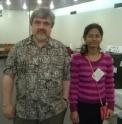SIUE hosts 7th conference on function spaces

Krysztof Jarosz, professor of mathematics and statistics, accomodates a participant traveling to a conference at SIUE on function spaces. Photo courtesy of Jarosz.
The 7th Conference on Function Spaces drew in more than 100 professors and scholars in mathematics to SIUE in May.
Krzysztof Jarosz, professor of mathematics and statistics, has worked alone to organize the event every four years since 1990. For each event he has applied for and received funding through grants from the National Science Foundation and SIUE graduate school, contacted research institutions to recruit participants and arranged speakers. He also hires several students to help during the conference.
Adam Weyhaupt, chair of the Mathematics and Statistics Department, said the international conference is “quite an event” and “an incredible undertaking” by Jarosz.
“I know it’s an enormous amount of work that he has carefully honed throughout years to be a great experience for everybody,” Weyhaupt said. “He organizes great research events during the day and then good social events in the evening so that participants of different ages and stages of their career can get together and talk about mathematics.”
The main topic of function spaces, according to Jarosz, is investigating spaces and large collections of various functions.
Jarosz said where the major goal in calculus is to provide tools for engineering and other sciences, function spaces is a more theoretical and fundamental area in mathematics that “provides models for more advanced more abstract situations.”
“Models do not involve just a few numbers or few vectors,” Jarosz said. “We model particular situations based on…certain infinite dimensions of spaces, and then we analyze these collection of spaces.”
According to Jarosz, his goal when he established the conference was to bring visibility to the university and benefit people working in the area.
“SIUE is becoming better known,” Jarosz said. “We have more students-potential students who may want to come here. We establish research and teacher collaborations with other universities.”
Jarosz also said networking is important component of the conference.
“It gives [participants] the opportunity to meet, work and initiate collaboration with mathematicians that work in the same or similar field,” Jarosz said.
The conference stimulates “good research” within the mathematical community as participants present “highly specialized research papers” according to Jarosz.
“I had many positive comments and received several dozens of papers,” Jarosz said.
The research papers discussed at the conference, according to Jarosz, often offer new results within mathematics that have not been published.
Jarosz added that participants not only get to present their findings and listen to results of other scholars, but also have their research reviewed by experts in the field and to be published.
Jarosz is working to prepare the proceedings of the conference for publication with the American Mathematical Society by early 2015. This would be his seventh publication from the conferences.
Page 1 of 3 | Next page